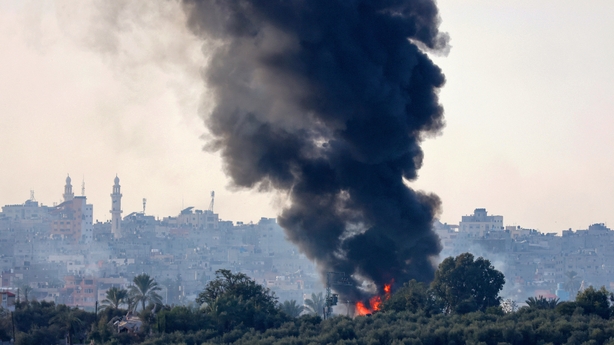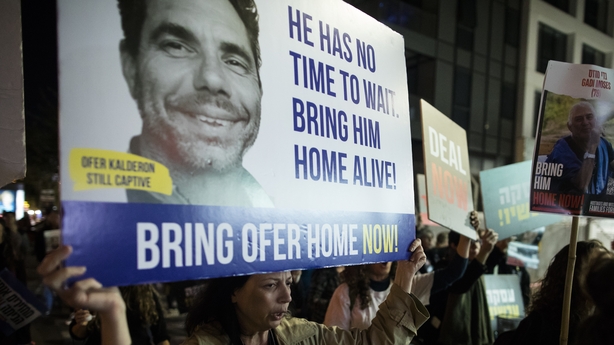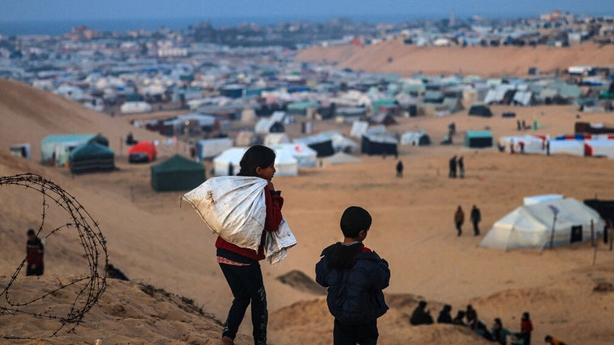US President Joe Biden has pushed Israeli Prime Minister Benjamin Netanyahu on the need for future Palestinian statehood, as the two leaders spoke for the first time in a month amid tensions over plans for the aftermath of the Gaza war.
The call came a day after Mr Netanyahu said he opposes allowing Palestinian sovereignty in the wake of the conflict with Hamas, deepening Israeli divisions with key backer Washington over the conduct of Israel's offensive and what comes next.
"The president still believes in the promise and the possibility of a two-state solution" for both Israelis and Palestinians, US National Security Council spokesman John Kirby told reporters in a briefing at the White House after the call.
During his conversation with Mr Netanyahu, Mr Biden "made clear his strong conviction that a two-state solution is still the right path ahead. And we're going to continue to make that case".
"Good friends and allies can have those kinds of candid, forthright discussions and we do," added Mr Kirby.
The call also discussed US hostages still among those held captive by Hamas since the 7 October attack on Israel, he added.

Mr Biden and Mr Netanyahu last spoke on 23 December and the silence between them since has led to repeated questions about a rift.
The pair have had a notoriously complicated relationship in the past, with the Democratic US president last year pressing the right-wing Israeli premier over controversial judicial reforms.
But Mr Biden has stood firmly behind Israel since 7 October, even travelling to the country after the attacks, where he publicly embraced Mr Netanyahu and pledged full US support.
Fresh tensions have emerged since then however as the toll of the Israeli offensive on Gaza has mounted, with Mr Biden warning that Israel could lose support by "indiscriminate bombing".
Israel's government is also bristling at the US push for a future solution to include statehood for the Palestinians.
Mr Biden ended his tense last call with Mr Netanyahu in December abruptly amid a disagreement over vital Palestinian tax revenues held by Israel, saying "this conversation is over," Axios reported.
The call today was not however in direct response to Mr Netanyahu's comments the day before, Mr Kirby said, adding that they had been trying to plan it for some time.
Mr Netanyahu said yesterday that his country "must have security control over all the territory west of the Jordan (River)" and that he had made this clear to Israel's "American friends".
We need your consent to load this rte-player contentWe use rte-player to manage extra content that can set cookies on your device and collect data about your activity. Please review their details and accept them to load the content.Manage Preferences
"This is a necessary condition, and it conflicts with the idea of (Palestinian) sovereignty," Mr Netanyahu said in public remarks.
One day earlier at the World Economic Forum in Davos, Switzerland, US Secretary of State Antony Blinken said Israel would not get "genuine security" without a "pathway to a Palestinian state."
During a trip to the Middle East last week, Mr Blinken emphasized to Israeli authorities that Arab countries, including Saudi Arabia, were committed to helping reconstruct Gaza and aiding with future Palestinian governance, but only on the condition that Israel clear the path for Palestinian statehood.
Mr Netanyahu maintained yesterday that "a prime minister in Israel should be able to say no, even to our best friends -- to say no when necessary, and to say yes if possible."
The 7 October attacks resulted in the deaths of about 1,140 people in Israel, most of them civilians, according to an AFP tally based on official Israeli figures.
Militants also seized about 250 hostages, around 132 of whom Israel says remain in Gaza.

Israel's relentless air and ground offensive has killed at least 24,762 Palestinians, around 70 percent of them women, young children and adolescents, according to Gaza's health ministry.
Meanwhile, internet services are starting to return to Gaza, telecom operator Paltel said, after the longest outage since the Israel-Hamas war broke out.
Gaza's internet and telecommunication services have been constantly disrupted throughout the war, with Paltel blaming Israel's bombardment of the Palestinian territory for the outages.
In the most recent interruption, residents have been largely without internet and telephone services for a full week, according to internet monitor NetBlocks.
"We announce the gradual return of communication services in various areas of the Gaza Strip," Paltel said in a statement.
The restarting of internet services was later confirmed by the territory's telecommunications ministry.
The United Nations has warned that the blackouts are worsening the Palestinian territory's already dire humanitarian situation.
"The blackout of telecommunications prevents people in Gaza from accessing lifesaving information or calling for first responders and impedes other forms of humanitarian response," the UN humanitarian agency OCHA said yesterday.
Today gunfire and air strikes left Gaza's city of Khan Younis shaken, witnesses said, where Israel is pressing its southward push against Hamas.

The Palestinian Red Crescent reported intense artillery fire near the city's Al-Amal hospital, while the health ministry in Hamas-run Gaza said 77 people were killed and dozens wounded overnight.
At the city's Al-Nasser hospital, a child with a bloodied face cried on a gurney. Ambulances arrived with the injured and the dead while in the darkened city beyond, automatic weapons fire sounded. An orange fireball flashed above rooftops.
Israel says it still expects the war to continue for months.
UN agencies say improved aid access is needed urgently as famine and disease loom, but a communications blackout which continue for an eighth day only added to the challenges.
Loss of connectivity "prevents people in Gaza from accessing lifesaving information or calling for first responders and impedes other forms of humanitarian response," said the UN humanitarian agency, OCHA.
More stories from the Middle East
With Israel's military offensive moving farther south in the territory, which is about 40km long, some residents in northern Gaza have begun returning home to what remains of their neighbourhoods.
In Gaza City's Rimal district, rubble has been ploughed to the sides of some dirt roads but others are still clogged with pieces of collapsed buildings.
One modern mid-rise building was still standing, its windows shattered. Another tower was a burned-out shell.
"Everything is destroyed and the people are dying of hunger," said Ibrahim Saada, a bandage on his left thumb. He said he lost his whole family.
Israel's army in earlier this month said the Hamas command structure in northern Gaza had been dismantled, but groups of isolated fighters still confront troops there.
Today, the military said ground troops backed by air support had killed several armed militants in the north.
A Hamas statement reported combat in the north's Jabalia refugee camp and nearby Gaza City area.

